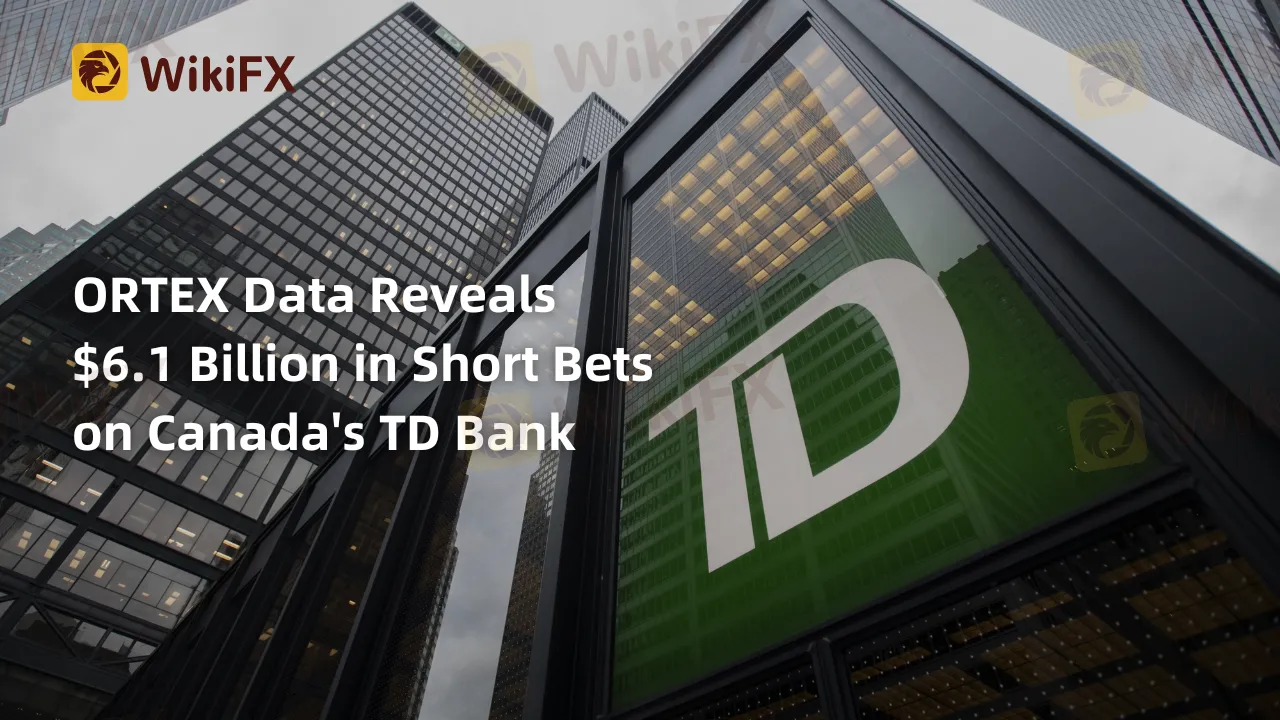简体中文
繁體中文
English
Pусский
日本語
ภาษาไทย
Tiếng Việt
Bahasa Indonesia
Español
हिन्दी
Filippiiniläinen
Français
Deutsch
Português
Türkçe
한국어
العربية
ORTEX Data Reveals $6.1 Billion in Short Bets on Canada's TD Bank
Abstract:TD Bank Group's short interest has surged to $6.1 billion, a 45% increase, due to concerns surrounding its acquisition of First Horizon amid the collapse of U.S. regional lenders. Arbitrage investors betting on the deal are believed to be behind the heightened short interest. TD will address the $13.4 billion acquisition at its annual general meeting.

Short interest in TD Bank Group (TD.TO) soared to $6.1 billion on Wednesday, a 45% increase from two weeks ago, as per ORTEX data calculations. The spike comes just before the Canadian lender's annual general meeting and is primarily attributed to TD's planned acquisition of U.S. lender First Horizon (FHN.N).
The collapse of U.S. regional lenders Silicon Valley Bank and Signature Bank last month has intensified scrutiny of the transaction. Consequently, some shareholders have urged TD to abandon the deal or renegotiate for a lower price. Analyst James Shanahan of Edward Jones believes that arbitrage investors betting on the First Horizon deal are responsible for the heightened short interest, as the market is concerned about the deal's likelihood of completion.
Arbitrage investors, often event-driven hedge funds, bet on mergers and acquisitions by purchasing shares of the target company and shorting the acquirer's stock. Analyst Lemar Persaud of Cormark Securities points to the uncertainty surrounding the First Horizon deal closure and its potential cost as the primary factor influencing short interest. Persaud also notes that the failures of SVB and Signature Bank have raised concerns due to TD's significant retail operations.

TD Bank is expected to address the $13.4 billion acquisition of First Horizon during its AGM on Thursday in Toronto, as it awaits regulatory approval. Hedge funds have shorted approximately 5.5% of TD's outstanding shares, while the second-most shorted bank stock, Bank of America (BAC.N), had only $2.9 billion or 1.2% worth of short bets.
Short-selling involves hedge funds borrowing stock from institutional investors and selling it back when the price falls, profiting from the difference. TD shares have dropped 0.1% since the U.S. regional banking crisis began but have risen 3.4% this week.
While the Bank of Montreal (BMO.TO) and Royal Bank of Canada (RY.TO) also have exposure to the U.S. banking system, they had around $2.1 billion and $2.2 billion worth of shares out on loan, respectively, as per ORTEX data. A TD spokesperson declined to comment on the matter.
Download and install the WikiFX App on your smartphone to stay updated on the latest news.
Download the App: https://social1.onelink.me/QgET/px2b7i8n

Disclaimer:
The views in this article only represent the author's personal views, and do not constitute investment advice on this platform. This platform does not guarantee the accuracy, completeness and timeliness of the information in the article, and will not be liable for any loss caused by the use of or reliance on the information in the article.
Read more

Yen Rebounds! Is This the Opportunity Investors Have Been Waiting For?
The Japanese yen has staged a sharp rebound, breaking below key technical levels against the U.S. dollar. With diverging central bank policies, heightened risk sentiment, and a shifting macro backdrop, is this a real opportunity—or a trap?

VIPS Group of Companies Exposed: ED Seizes Assets in 100-Crore Ponzi Forex Scam
The Enforcement Directorate (ED) has cracked down on an INR 100-crore scam involving illegal forex trading and Ponzi schemes by seizing immovable assets and digital devices besides freezing bank accounts across multiple cities in India. Read more.

Foraxi Joins the WikiFX Family
Explore how the addition of Foraxi to the WikiFX family opens up forex trading growth avenues for traders around the world.

Iran’s Strait Strategy: Is the World Ready for $100 Oil?
Tensions in the Middle East are rising quickly, and global oil markets are already feeling the pressure. Since Iran and Israel entered open conflict, oil prices have jumped from around $60 to nearly $80 per barrel. Now, with the United States joining the fight and launching strikes against Iran, the situation has become even more serious. Iran’s threat to seal off the Strait of Hormuz could ignite a global energy meltdown, spike oil prices beyond $100, and unleash economic chaos across the world.
WikiFX Broker
Latest News
Top Wall Street analysts like these three stocks for long-term growth
Dow futures slide 150 points as oil rises following U.S. bombing of Iran: Live updates
Asia-Pacific markets set to open lower as U.S. bombing of Iran escalates Middle East crisis
Oil at $100 a barrel? U.S. role in Iran-Israel fight fuels market jitters
Consob Blocks 7 Fraudulent Investment Websites Amid Ongoing Crackdown
MyFundedFutures Tightens Compliance Measures Following Regulatory Pressure
Investors Beware! The Pound May Face a Downturn in the Second Half of the Year
European markets start the week lower as Middle East crisis worsens
Latest FCA Warning List Out! Beware & Protect Your Money
European defense stocks sell-off intensifies after U.S. hits Iran
Currency Calculator


